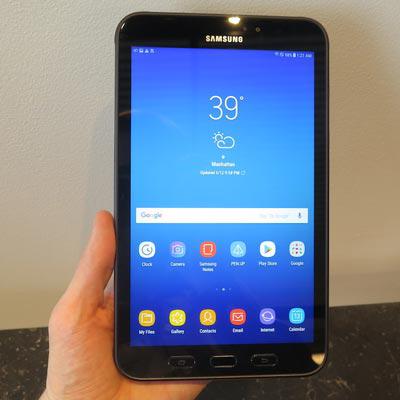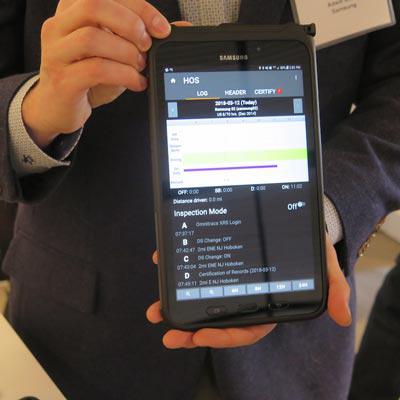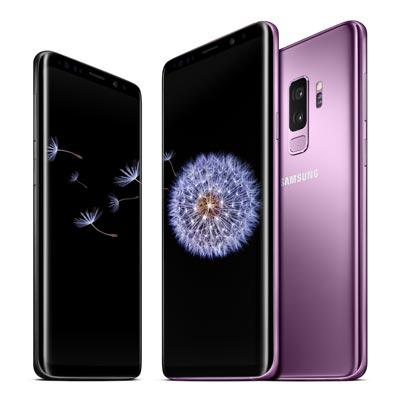Samsung Mobile Channel Chief On Going Channel-Only For The New Galaxy Tablet And Samsung's 'Growth Tear' In B2B
Samsung's Channel Push
The past few weeks have been huge for Samsung's efforts to make greater inroads into the B2B market with the help of IT channel partners. First, Samsung launched an Enterprise Edition for the new Galaxy S9 smartphone, which is being sold unlocked by channel partners. The Enterprise Edition S9 features enterprise customization through Knox Configure and simplified deployment capabilities via enterprise firmware over-the-air. Then, Samsung debuted a new rugged tablet that is exclusive to the channel -- the Galaxy Tab Active2 -- which includes special capabilities for a number of industry verticals. The Tab Active2 is the first LTE-enabled tablet from Samsung that's being sold exclusively by channel partners.
The launches are "a huge testament to the strength and the potential of our B2B push into the channel," Samsung mobile channel chief Mike Coleman told CRN. "We're starting to build B2B-specific devices that solve real business problems and that partners can make money on."
Coleman sat down at Samsung's offices in New York to discuss the channel opportunities for the new devices and how Samsung has enhanced its program for solution providers. "We're on a growth tear," he said. "We've added folks to the [channel] team. We're bringing new products to market that are B2B-specific. And I think you'll see that continue."
What follows is an excerpt of CRN's interview with Coleman.

How would you describe the channel opportunity for the Tab Active2?
The pre-orders are significant from distribution -- that's usually a good sign that there is pent-up demand in the channel. We have been able to pre-release this to a number of end-user customers, and it was announced in Europe earlier, so we were able to leverage those two components. And we've had a significant number of proofs-of-concept. One of the things I find really interesting is that once we announce a product like this, and partners get a chance to look and see it, they figure out where else it could be used. So we have transportation, manufacturing, warehousing, some health care, oil and gas forthcoming -- those are where we're starting. [But] there are untold uses right now for it beyond what we already announced.

So the opportunity really is to build a whole solution -- where partners are getting margin on the device but are also bringing in other pieces? Could you talk about the financial opportunity here for partners?
It's all about margin for the partners. And so we're mindful of the fact that [margin] is super important. So the first thing that I think worth mentioning is that it's only available in the channel, which I think is a huge testament to the strength and the potential of our B2B push into the channel. And what we're seeing with the addition of the Tab Active 2, and with the Enterprise Edition of the [Galaxy] phones, we're starting to build B2B-specific devices that solve real business problems and that partners can make money on. So not only do they make margin on the device, they make money on the software, they do app dev themselves, they make money on the services, they make money on the accessories. And I guess most importantly is that there's a big push for subscription modeling -- mobility-as-a-service and device-as-a-service -- where there's the annuity from the subscription, with an automatic tech refresh at the end of the second or the third year. There are quite a few partners that have built those practices or are building them.

Do you see this product as another thing you can point to as Samsung works to attract channel partners?
Exactly. My team tripled in size, from last year to this year, with the recognition at Samsung that the IT channel is absolutely the place where we need to re-invest and double down in terms of investing. So we've added quite a few new folks to the team. I now have a full team dedicated to what we call the 'geo' space, which is six [geographies] in the U.S. And their job is to recruit partners and to work with those partners in that space, that are willing to 'give-get' with Samsung. We call it the Mobility Solution Partner Program, and that's in full swing. We have quite a recruitment campaign; we have added quite a few new partners to that. And now with that full slate of sales folks in the geographies, we're starting to see the pipeline build significantly.
Are you still targeting partners that have a mobility practice or that are looking to build a mobility practice?
Yes. So we have three groups in my organization. We have the geo coverage model. We have the NSP [national solution provider] -- CDW, Insight, PC Connection -- I have a team just focused on them. And then I have a third team that I recently took on, which is the alliances team. Jim Heesacker [Samsung's vice president of strategic alliances] now reports into my organization. So now we have an ecosystem of partners -- both those that are influencing and those that are selling.
We have to create awareness in the channel that Samsung has a specific mobility program, and there's value in it. You get a dedicated rep, you get MDF, you get access to events and our facilities, you get the ability to co-market with us. We also made a big change with our end-user sales force to now have a commissionable component tied to the IT channel, which has been a huge help. Because now we have a goal-congruent strategy in our go-to-market. So all of that comes together to what I consider to be a 'sweetener,' if you will -- a much better reason to invest in Samsung. Or if you've already invested, to double down.

Can you tell me more about the commissionable component for your sales force to work with the channel?
That started at the beginning of this year. In our world, it's all about goal congruence. So, how do you make sure that everybody's rowing together? And this is a way to help that. We never sold direct, so it's not like we had a direct sales force that was competing with partners. It was just a different focus on the carriers and elsewhere in the organization. Now this helps to provide a bit more goal congruence. I think it's huge for [partners] to know that there is that level of engagement. And now they can join sales activity, join pipeline development. I think it's really exciting to put that all together.

I noticed that the Galaxy S9 Enterprise Edition got a mention during the launch announcement at Mobile World Congress. Do you see Samsung as giving more visibility to its B2B efforts than in the past?
Yes. Samsung, as you know, grew up as a company focused on consumers. We're now investing heavily in the B2B side -- solving real business problems like [with the Tab Active2]. And so I think with that recognition comes the investment that Samsung is making. And first of all, making the devices available for B2B at the same time as consumer at launch is a huge step in the right direction -- introducing the Enterprise Edition at the same time [as the consumer version], and providing some airtime for that. So yes, I think that's all conspiring to create a sense of how exciting it is on the B2B side, and how much investment Samsung is making for us to be successful.

Do you feel like the awareness you've been building around unlocked phones is starting to pay off?
Yes. It's slow but sure, in terms of the U.S. adoption of unlocked, compared to Europe and Asia, which are further ahead. We recently have seen a surge in orders from distribution. That's our telltale sign that there's demand that is building in the channel. In some cases, customers are using them for Wi-Fi-only devices -- say, in hospitals where you don't need connectivity. An unlocked phone is perfect for that because you don't need to pay for [cellular] service. Others are buying it for [cellular] connectivity. And then having choice between the four carriers [AT&T, Sprint, T-Mobile and Verizon], and being able to negotiate a bit better with the carriers. Partners are starting to embrace it.

What else do you want solution providers to know?
We're on a growth tear. We've added folks to the [channel] team. We're bringing new products to market that are B2B-specific. And I think you'll see that continue. We're looking for more and more partners. And we're also seeing partners realize -- with the onset of the [public] cloud -- that there's some risk associated with server, storage and networking. Because some of that is being resold through the cloud experience. And so with that, we've been talking to all of the execs at the major partners, and saying, 'Look, this is the perfect hedge against the [public cloud] risk.' We think if you build a mobility practice, that is not 'cloud-ifiable,' so to speak. There are some really interesting dynamics that I think will help partners rethink their approach and maybe re-invest in something that's different. We're finding that it's a bit of a new trick for an old dog, so to speak. But once they understand it and embrace, we're starting to see some really great traction on that.
We're starting to see the pipeline build with a significant number of [partner] deals that are sizable in nature. And so I would say, yes, the partner recruitment is on track. But with the numbers that we've been given [for] our growth expectations, we need more.